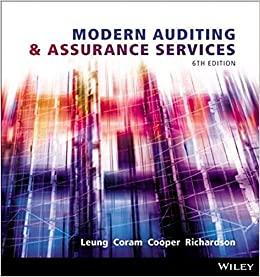Answered step by step
Verified Expert Solution
Question
1 Approved Answer
Auditors make materiality judgments when planning the audit to be sure they ultimately gather sufficient appropriate evidence during the audit to provide reasonable assurance that
Auditors make materiality judgments when planning the audit to be sure they ultimately gather sufficient appropriate evidence during the audit to provide reasonable assurance that the financial statements are free of material misstatements. Auditors often use quantitative benchmarks such as 1% of total assets or 5% of net income to determine whether misstatements materially affect the financial statements (planning materiality), but ultimately, it is an auditor's individual professional judgment as to the appropriate levels of materiality.
- An auditor typically sets the initial amount of overall materiality using a quantitative approach. Then the auditor considers qualitative items, such as expectations relating to analysts' EPS forecasts, financial statement items on which users will focus their attention, nature of the client and industry, size of the client, the nature of the client's financing, and volatility of the benchmark. How might these qualitative factors influence the overall materiality that the auditor will use in planning the audit? Assume that Client A has a number of these qualitative factors noted above, while Client B does not (therefore, Client A is riskier than Client B). How might this information affect planning materiality?
- Assume that Client A has a number of these qualitative factors noted above, while Client B does not (therefore, Client A is riskier than Client B). Assume that Client B is similar in size to Client A. After setting planning materiality for both clients, the auditor has determined that performance materiality for Client B is $5,000. Should the performance materiality threshold for Client A be the same for Client B? For which client will the auditor require more evidence?
- How might an auditor's individual characteristics affect his or her professional judgments about materiality?
- Assume that one auditor is more professionally skeptical than another auditor. Compare the possible alternative performance materiality thresholds that a more versus less skeptical auditor might make for Client A.
Step by Step Solution
There are 3 Steps involved in it
Step: 1

Get Instant Access to Expert-Tailored Solutions
See step-by-step solutions with expert insights and AI powered tools for academic success
Step: 2

Step: 3

Ace Your Homework with AI
Get the answers you need in no time with our AI-driven, step-by-step assistance
Get Started


